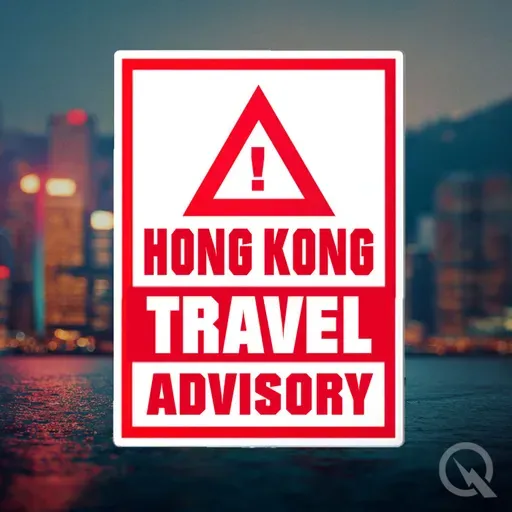
18 October 2025
Travel Alert Hong Kong Safety Guide Essential Tips for Visitors Navigating City Risks and Precautions
Hong Kong Travel Advisory
About
Listeners planning travel to Hong Kong should exercise a high degree of caution. Authorities in Australia and Canada both emphasize that Hong Kong continues to be one of Asia’s safest cities for travelers, where violent crime is rare, but travelers should be vigilant for petty crime such as pickpocketing, especially in crowded areas, markets, airports, and public transport. Drink spiking incidents have been reported, so keeping food and beverages in sight is wise. Sexual assault rates are low, but basic precautions are recommended, particularly for those engaging with strangers in nightlife districts like Wan Chai.
Travelers must also be wary of frequent fraud—including credit card and ATM scams—and are advised to monitor bank accounts closely, use ATMs inside banks, and cover PIN entries. Demonstrations, protests, or gatherings are illegal without government approval and participation—even inadvertently—can result in severe legal penalties. Even peaceful gatherings can quickly escalate, causing risk of arbitrary detention, and listeners should avoid filming or photographing protests.
Hong Kong is experiencing increased police presence due to national security enforcement and digital communications may be monitored by authorities. Listeners who are journalists, researchers, or intend to engage in activism should be especially cautious, as some topics are highly sensitive and may be subject to censorship.
The city’s healthcare services are world-class but costly for non-residents, making comprehensive travel insurance essential. Pharmacies are well-stocked, and tap water is safe to drink. Air pollution can be severe and the Hong Kong Observatory provides regular alerts—listeners prone to respiratory issues should stay updated and limit outdoor activities during high pollution periods.
Natural hazards are an ongoing concern from May to October, with frequent typhoons, heavy rain, flooding, and landslides. Disruptions to air, ferry, and ground transport are common during severe weather events. The Hong Kong Observatory will issue warnings, and travelers should monitor local media and follow all guidance from authorities, as well as be prepared to alter travel plans at short notice.
Recent regulatory changes have made cross-border travel easier for drivers heading to mainland China or Macao as Hong Kong has removed permit requirements effective October 2025, streamlining access for motorists according to Travel and Tour World. Public transportation throughout Hong Kong remains efficient and safe, though urban traffic congestion is routine.
Listeners from Nepal should note that a visit visa or entry permit must be obtained before arrival as there is no visa-free access for Nepali nationals. Generally, travelers are recommended to consult their own government’s latest advisories before visiting Hong Kong for updates on safety, security, and entry requirements.
For emergency services in Hong Kong, call 999 for police, fire, or medical assistance. Staying informed and prepared—both for legal and environmental risks—will ensure a safe and memorable visit to Hong Kong.
This content was created in partnership and with the help of Artificial Intelligence AI
Travelers must also be wary of frequent fraud—including credit card and ATM scams—and are advised to monitor bank accounts closely, use ATMs inside banks, and cover PIN entries. Demonstrations, protests, or gatherings are illegal without government approval and participation—even inadvertently—can result in severe legal penalties. Even peaceful gatherings can quickly escalate, causing risk of arbitrary detention, and listeners should avoid filming or photographing protests.
Hong Kong is experiencing increased police presence due to national security enforcement and digital communications may be monitored by authorities. Listeners who are journalists, researchers, or intend to engage in activism should be especially cautious, as some topics are highly sensitive and may be subject to censorship.
The city’s healthcare services are world-class but costly for non-residents, making comprehensive travel insurance essential. Pharmacies are well-stocked, and tap water is safe to drink. Air pollution can be severe and the Hong Kong Observatory provides regular alerts—listeners prone to respiratory issues should stay updated and limit outdoor activities during high pollution periods.
Natural hazards are an ongoing concern from May to October, with frequent typhoons, heavy rain, flooding, and landslides. Disruptions to air, ferry, and ground transport are common during severe weather events. The Hong Kong Observatory will issue warnings, and travelers should monitor local media and follow all guidance from authorities, as well as be prepared to alter travel plans at short notice.
Recent regulatory changes have made cross-border travel easier for drivers heading to mainland China or Macao as Hong Kong has removed permit requirements effective October 2025, streamlining access for motorists according to Travel and Tour World. Public transportation throughout Hong Kong remains efficient and safe, though urban traffic congestion is routine.
Listeners from Nepal should note that a visit visa or entry permit must be obtained before arrival as there is no visa-free access for Nepali nationals. Generally, travelers are recommended to consult their own government’s latest advisories before visiting Hong Kong for updates on safety, security, and entry requirements.
For emergency services in Hong Kong, call 999 for police, fire, or medical assistance. Staying informed and prepared—both for legal and environmental risks—will ensure a safe and memorable visit to Hong Kong.
This content was created in partnership and with the help of Artificial Intelligence AI